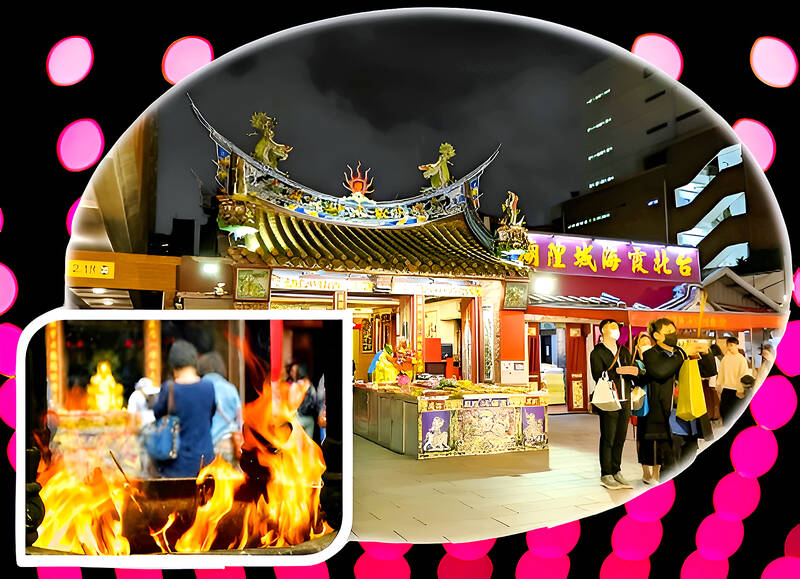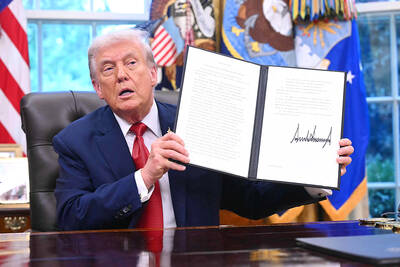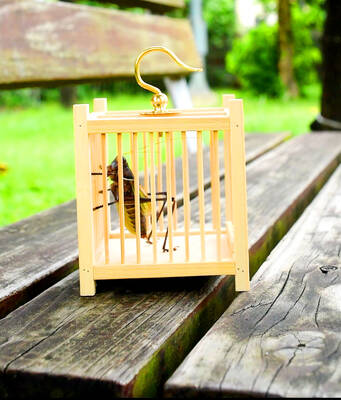對話 Dialogue
清清:華華,一年一度的台北霞海城隍廟文化節就要登場了,你要不要也一起去大稻埕逛逛?
Qīngqing: Huáhua, yìnián yídù de Táiběi Xiáhǎi Chénghuángmiào Wénhuà jié jiù yào dēngchǎng le, nǐ yàobúyào yě yìqǐ qù Dàdàochéng guàngguang?

Photo: Wikimedia Commons/ 照片:Wikimedia Commons 提供
華華:哪裡需要等到文化節?我平常就會去啦!去拜霞海城隍廟,也去附近吃吃美食。
Huáhua: Nǎlǐ xūyào děngdào Wénhuà jié? Wǒ píngcháng jiù huì qù la! Qù bài Xiáhǎi Chénghuángmiào, yě qù fùjìn chīchī měishí.
清清:你這麼想脫單喔?霞海城隍廟的月老這麼靈驗,都沒幫你找到合適的對象,看來你真的該好好檢討檢討了!
Qīngqing: Nǐ zhème xiǎng tuōdān o? Xiáhǎi Chénghuángmiào de Yuèlǎo zhème língyàn, dōu méi bāng nǐ zhǎodào héshì de duìxiàng, kànlái nǐ zhēnde gāi hǎohǎo jiǎntǎo jiǎntǎo le!
華華:你再說一遍試試!我才不是去拜月老呢!霞海城隍廟還有其他不同的神啊!既然是城隍廟,主神就是城隍爺,求財、消災、保平安都可以請城隍爺幫忙呢!
Huáhua: Nǐ zài shuō yíbiàn shìshi! Wǒ cái búshì qù bài Yuèlǎo ne! Xiáhǎi Chénghuángmiào háiyǒu qítā bùtóng de shén a! Jìrán shì chénghuángmiào, zhǔshén jiùshì Chénghuángyé, qiú cái, xiāo zāi, bǎo píng’ān dōu kěyǐ qǐng Chénghuángyé bāngmáng ne!
清清:還以為全世界都敬佩的超級月老,到了你這裡就砸了招牌了呢!
Qīngqing: Hái yǐwéi quánshìjiè dōu jìngpèi de chāojí Yuèlǎo, dàole nǐ zhèlǐ jiù zá le zhāopái le ne!
華華:緣分和時機到了的時候,月老一定不會忘了我的,我對祂有信心!
Huáhua: Yuánfèn hé shíjī dàole de shíhòu, Yuèlǎo yídìng búhuì wàngle wǒ de, wǒ duì tā yǒu xìnxīn!
清清:不過拜月老是有規矩的,你有沒有按照規矩來呢?如果不清楚,可以問廟方人員,請他們幫你。
Qīngqing: Búguò bài Yuèlǎo shì yǒu guījǔ de, nǐ yǒu méiyǒu ànzhào guījǔ lái ne? Rúguǒ bù qīngchǔ, kěyǐ wèn miàofāng rényuán, qǐng tāmen bāng nǐ.
華華:心誠則靈,不用太在乎那些有的沒的啦!找個時間,我們一起去看看古蹟、吃吃附近老店有名的小吃吧!
Huáhua: Xīnchéng zé líng, búyòng tài zàihū nèixiē yǒude méide la! Zhǎo ge shíjiān, wǒmen yìqǐ qù kànkan gǔjī, chīchī fùjìn lǎodiàn yǒumíng de xiǎochī ba!
翻譯 Translation
Qingqing: Huahua, the annual Taipei Xiahai City God Temple Cultural Festival is about to kick off. Do you want to join me in exploring Dadaocheng?
Huahua: Why wait for the cultural festival? I often go there anyway. I visit the Xiahai City God Temple and indulge in some nearby delicacies.
Qingqing: Are you trying to fall in love? The matchmaker at Xiahai City God Temple is so effective, yet hasn’t found you a suitable match. Looks like you need to take a good look at yourself!
Huahua: Say that again! I’m not going there to pray to the matchmaker! Xiahai City God Temple has other deities too. Since it’s a City God temple, the main deity is the City God, who can help with wealth, safety and peace.
Qingqing: I thought the world-renowned matchmaker would uphold their reputation, but apparently not when it comes to you!
Huahua: When fate and timing align, the matchmaker will not forget me. I have faith in him.
Qingqing: But there are rules to worshiping the matchmaker. Have you followed them? If you’re unsure, you can ask the temple staff for assistance.
Huahua: Sincerity matters the most; don’t worry too much about the formalities. Let’s find a time to explore the historic sites together and savor the famous snacks from nearby old shops!
生詞 Vocabulary
1. 城隍 (Chénghuáng) City God
2. 月老 (Yuèlǎo) the Matchmaker Deity
3. 靈驗 (língyàn) miraculous, divine efficacy
4. 檢討 (jiǎntǎo) review, critique
5. 敬佩 (jìngpèi) admire; admiration
6. 砸招牌 (zá zhāopái) smash one’s signboard
7. 心誠則靈 (xīnchéng zé líng) [phrase] Sincerity brings success
8. 古蹟 (gǔjī) historical site
教材音檔 Audio Files
國立清華大學華語中心提供
By National Tsing Hua University Chinese Language Center:

The content recommendation algorithm that powers the online short video platform TikTok has once again come under the spotlight after the app’s Chinese owner ByteDance signed binding agreements to form a joint venture that will hand control of operations of TikTok’s US app to American and global investors, including cloud computing company Oracle. Here is what we know so far about its fate, following the establishment of the joint venture. IS BYTEDANCE CEDING CONTROL? While the creation of this new entity marks a big step toward avoiding a US ban, as well as easing trade and tech-related tensions between Washington and Beijing, there

The world is teeming with danger and unpredictability. To safeguard themselves from harm and invite good fortune, people across cultures carry or display symbolic charms and trinkets. It is common to see beckoning cat figurines in stores in Japan, while people in China have historically kept crickets in cages for good luck. Even flora can serve as emblems of luck, with the four-leaf clover standing out as perhaps the most iconic. A clover is a small plant that typically grows 10 to 30 cms in height. While there are many species of clover, the variety that people consider to

Prompted by military threats from Russia, Denmark has recently passed a new conscription law, officially including women in its military draft for the first time. From July 1, 2025, Danish women, upon turning 18, will be entered into the draft lottery. If selected, they are to serve in the military for 11 months, just as men do. Not only has this decision attracted international attention, but it has also sparked discussions on gender, equality and national defense. Although Denmark’s reform appears to promote gender equality, it primarily responds to regional instability and the need to strengthen national defense. With

Continued from yesterday(延續自昨日) https://www.taipeitimes.com/News/lang Many people attribute the four-leaf clover’s reputation for luck not merely to its rarity but also to the myths and legends that surround it. Here are two such tales that help shed light on how the four-leaf clover came to be seen as a lucky charm. The first story originates from the Biblical narrative of Adam and Eve. According to Christian tradition, Adam and Eve, the first humans created by God, resided in the idyllic Garden of Eden. After they were expelled for defying God’s command, Eve is said to have plucked a four-leaf clover as a